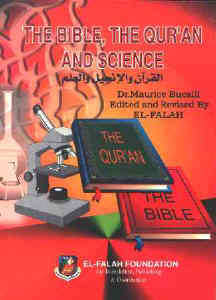Qur'anic and Biblical Narrations
General Outlines
A large number of subjects dealt with in the Bible are
also found in the Qur'an. Firstly, there are narrations
referring to the Prophets; Noah, Abraham, Joseph, Elias,
Jonah, Job and Moses; the Kings of Israel; Saul, David,
Solomon-to name just some of the main narrations they
share in common. There then follow more specific accounts
of great events in the course of which the supernatural
has intervened, e.g. the Creation of the Earth and
Heavens, the Creation of Man, the Flood, the Exodus.
Finally, there is all that has to do with Jesus and His
mother Mary as far as it concerns the New Testament.
What reflections do the subjects dealt with in the two
Scriptures provoke when viewed in the light of our modern
knowledge of them from extra-Scriptural sources?
With regard to the parallel of Qur'an/Gospels, one
must first note that none of the subjects referred to in
the Gospels, which were criticized from a scientific
point of view (see Part Two of this book), is quoted in
the Qur'an.
Jesus is referred to many times in the Qur' an, e.g.
Mary's annunciation of the nativity to his father, the
annunciation of the miraculous nativity to Mary, Jesus's
stature as a Prophet of the highest order, His role as a
Messiah, the Revelation He directs to Man which confirms
and modifies the Torah, His preachings, His disciples and
apostles, the miracles, His Ascension to God, His role in
the Last Judgment, etc.
Suras 3 and 19 of the Qur'an (the second of which
bears Mary's name) devote long passages to Jesus's
family. They describe His mother Mary's nativity, her
youth and the annunciation of her miraculous motherhood.
Jesus is always called 'Son of Mary'. His ancestry is
exclusively given with regard to His mother's side, which
is quite logical since Jesus had no biological father.
Here the Qur'an differs from Matthew's and Luke's
Gospels: as we have already seen, they give the paternal
genealogies of Jesus which are, moreover, different from
each other.
In the Qur'an, Jesus is placed according to His
maternal genealogy in the line of Noah, Abraham, and
Mary's father (Imran in the Qur'an):
--sura 3, verses 33 and 34:
"God chose Adam, Noah, the family of Abraham and the
family of Imran above all His creatures, as descendants
one from another."
So Jesus is descended from Noah and Abraham on His
mother Mary's side, and from her father Imran. The errors
made in the naming of the 'ancestors of Jesus' found in
the Gospels are not present in the Qur'an, nor are the
impossibilities in the genealogies contained in the Old
Testament of Abraham's ancestry, both of which were
examined in the first and second parts of this book.
Once again, this fact must be noted if one is to be
objective, and yet again its great importance appears
very clearly in the face of the unfounded statements
which are made claiming that Muhammad, the author of the
Qur'an, largely copied the Bible. One wonders in that
case who or what reason compelled him to avoid copying
the passages the Bible contains on Jesus's ancestry, and
to insert at this point in the Qur'an the corrections
that put his text above any criticism from modern
knowledge. The Gospels and Old Testament texts are quite
the opposite; from this point of view they are totally
unacceptable.
In the case of the Old Testament, certain aspects of
this parallel have already been dealt with. The Creation
of the world, for example, was the subject of a critical
study made in the Old Testament section of this book. The
same subject was examined with regard to the Qur'anic
Revelation. Comparisons were made and there is no need to
cover this ground again.
It seems that historical knowledge is too vague and
archaeological data too scarce for parallels to be
established in the light of modern knowledge on problems
concerning the Kings of Israel, who form the subject of
narrations in both the Qur'an and the Bible.
Whether or not one can tackle the problem of the
Prophets in the light of modern data depends on the
extent to which the events described have left traces
which may or may not have come down to us.
There are however two subjects dealt with in both the
Qur'an and the Bible which should command our attention
and which need to be examined in the light of modern
knowledge. They are as follows:
--the Flood,
--the Exodus.
--The first because it has not left traces in the
history of civilization which support the Biblical
narration, whereas modern data do not permit us to
criticize the narration contained in the Qur'an.
--The second because the Biblical and Qur'anic narrations
evidently complement each other in their broad outlines,
and modern data seem to provide both of them with
remarkable historical support.

